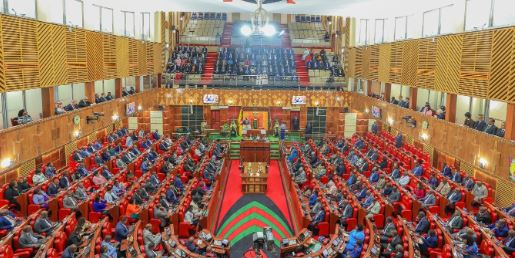
Members of Parliament say it’s acceptable for public officials to do business with the government, despite allegations of conflict of interest.
MPs are resisting President William Ruto’s attempt to prevent
public officials from engaging in business with the government, as proposed in
the Conflict of Interest Bill, 2023.
They are vigorously trying to overturn the President’s memorandum of rejection after Parliament substantially watered down the original Bill, leading to Ruto’s opposition and possible veto.
The head of state aimed to reinstate at least 12 clauses either removed or diluted.
However, the Senate Justice and Legal Affairs Committee is urging the House to reject most of the proposals.
“The Senate fully accommodates the President’s reservations to clauses 30, 31 and 35 of the Bill but does not accommodate reservations to clauses 2, 5, 6, 8, 12, 16, 17, 18, and 20,” the report by the committee chaired by Bomet Senator Hillary Sigei read.
The clauses accepted largely revolved around semantics — such as defining “material change” in income and asset declarations, and clarifying the Ethics and Anti-Corruption Commission’s (EACC’s) role in verifying such declarations.
One of the most contentious deletions by the National Assembly was a clause defining conflict of interest that included family, relatives, or associates.
MPs amended it to state that conflict arises only when a public officer fails to declare or register a private interest conflicting with the public interest.
The President rejected this, arguing that conflict of interest includes real, perceived, and potential conflicts, and that the amended clause failed to capture this complexity, weakening compliance mechanisms.
But the Senate committee disagreed, saying perceived conflicts are too subjective and could lead to implementation challenges.
“We recommend focusing on tangible and demonstrable conflicts to ensure clarity and effectiveness in governance,” the report read.
The President also proposed reinstating definitions for “family” and “relative,” which had been removed by the National Assembly.
He argued that omitting these definitions limits the Bill’s scope and opens loopholes for public officers to use relatives as proxies.
Ruto also called for empowering the EACC to initiate forfeiture proceedings against public officers who fail to disclose assets. However, the committee opposed the definition of “relative” as being overly broad.
Another sticking point was the clause on "good faith." The National Assembly introduced an amendment to shield public officers from legal action if preferential treatment was granted in good faith.
Ruto opposed the provision, arguing it undermines accountability and could be misused to justify unethical conduct.
The committee sided with MPs, stating that defining “good faith” should be left to the discretion of the courts.
MPs also deleted references to relatives in the clause prohibiting public officers from receiving gifts or favours.
Ruto wanted officers to declare gifts received by their relatives within 48 hours. The committee dismissed the proposal as overly broad and potentially invasive of relatives' privacy.
Similarly, a clause originally prohibiting relatives from receiving complimentary treatment was amended to apply only to public officers.
Ruto objected, saying relatives could still be used as proxies, but the committee rejected the reservation, arguing it was too expansive.
On Clause 20, which prohibits public officers from acquiring interests in businesses contracting with their reporting entities, the President called for reinstatement.
The committee, however, argued the provision lacked clarity on thresholds of ownership or control, and was therefore unworkable.
Another major point of contention is who should administer the law once enacted. The original Bill gave the EACC exclusive authority.
MPs, however, inserted a “reporting authority” to manage conflict of interest cases — effectively diluting the EACC’s powers.
President Ruto objected, saying this violates Article 79 of the Constitution, which mandates the EACC to enforce Chapter Six on leadership and integrity.
The President also proposed restoring EACC’s authority to
initiate forfeiture of undeclared or unexplained assets — power that MPs had
removed.
The committee agreed with this reservation but recommended amending the Proceeds of Crime and Anti-Money Laundering Act to clearly outline the EACC’s role to avoid conflicts with responsibilities of the Assets Recovery Agency.
The Bill has faced multiple setbacks since it was passed by the National Assembly in November 2023 and later endorsed by the Senate in June 2024 —both with substantial amendments that critics say undermine its original intent.
After the mediated version of the Bill was rejected by the President in April 2025, Parliament must decide whether to amend it in line with the President’s reservations or pass it again without changes, as provided under Article 115 (2) of the Constitution.
All eyes are now on the Senate to see whether it will approve the committee’s report, which only partially accommodates the President’s reservations.
If the report is adopted by two-thirds of the Senate, it will be forwarded to the National Assembly for concurrence before being returned to the President for assent.
Instant analysis
The Conflict of Interest Bill, 2023 aims at enhancing transparency, accountability, and integrity among public officers by regulating situations in which private interests could improperly influence public duties.














